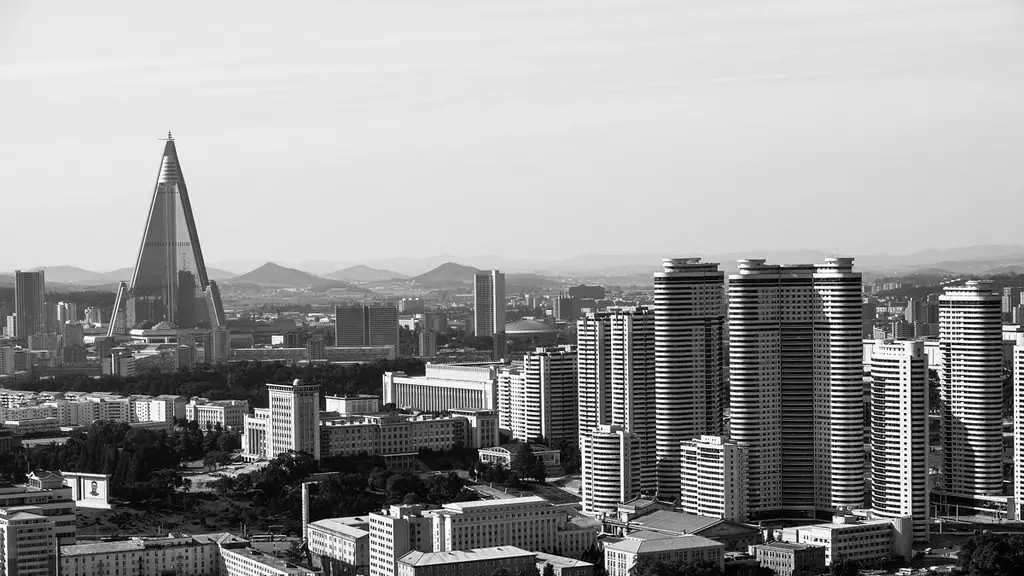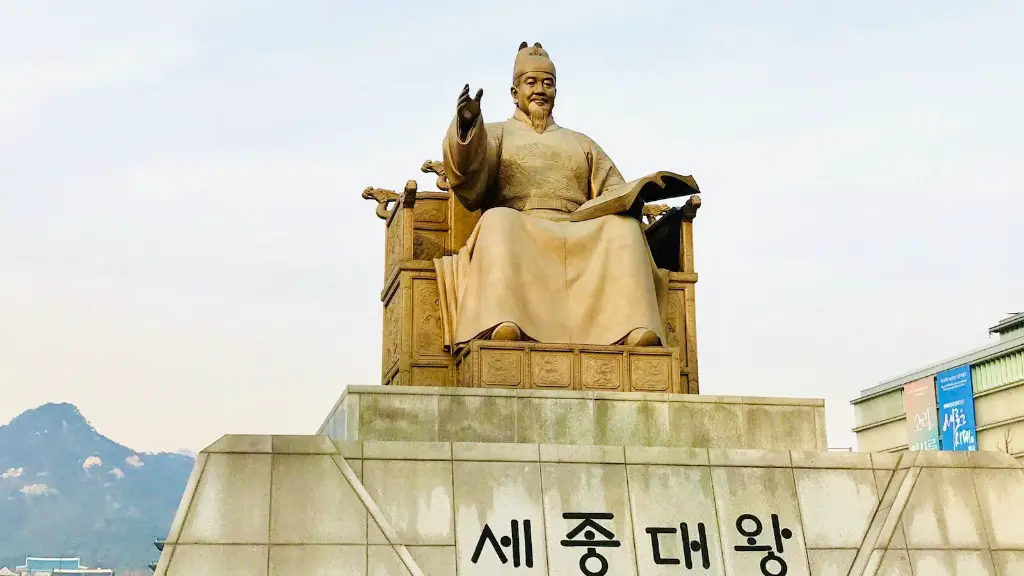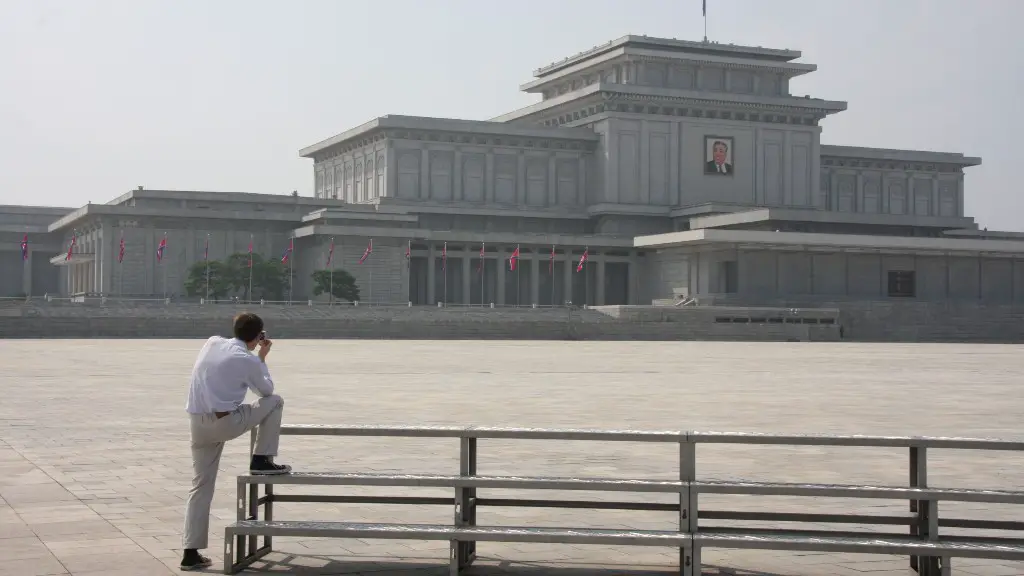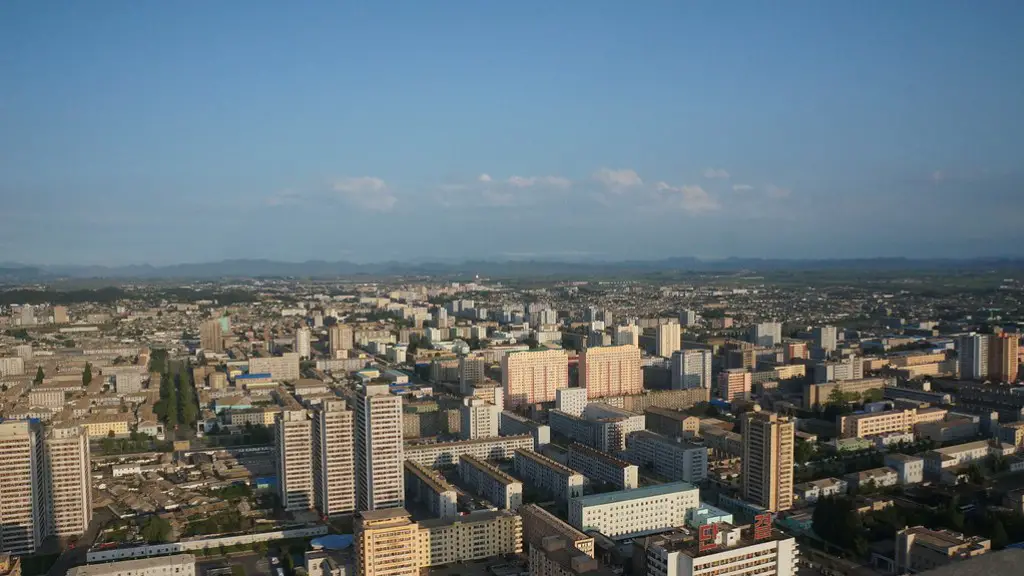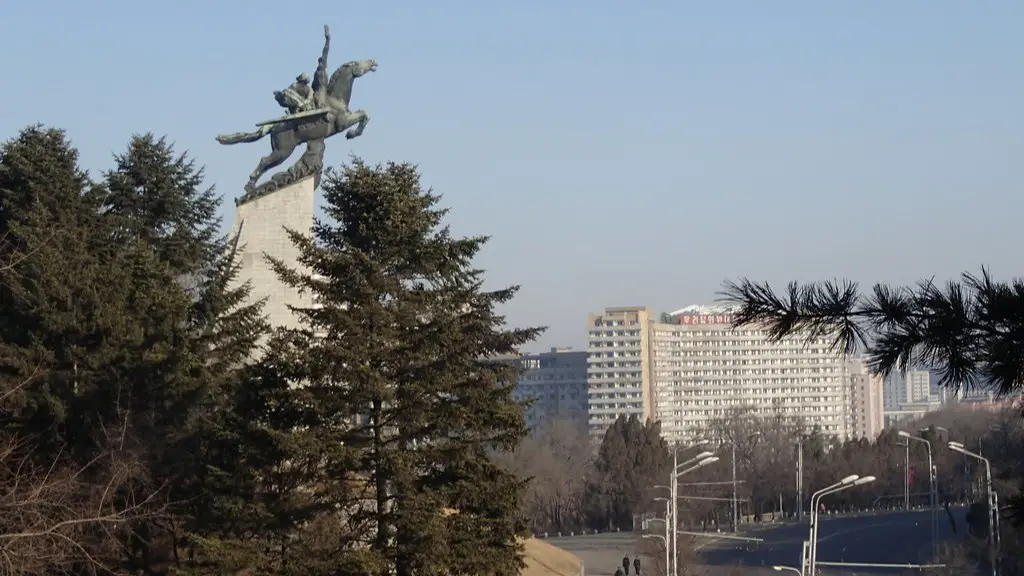Background Information
North Korea, a nation in East Asia, is the world’s only remaining fully-functioning authoritarian state. The nation has been under the rule of the same family dynasty since 1948, when the Democratic People’s Republic of Korea was established from the area of the former Empire of Japan. The current leader is Kim Jong Un, the grandson of the founding leader and son of the previous leader, Kim Jong Il. North Korea has long been one of the world’s most isolated countries, as well as one of the most repressive and authoritarian regimes.
The current North Korean regime is a totalitarian dictatorship, which is defined as a system of absolute power or control by a single individual, party or organization. The government has a highly centralized political system and the function and organizational structures within it are kept largely hidden from public view. Official government ideology places great emphasis on the party and sectoral activities, while the state-owned media act as the mouthpiece of the government. The state also heavily restricts individual freedom, as evidenced by limited access to the Internet, hard-line censorship of media outlets and strict control over citizens’ activities.
Relevant Data
Government figures on economic performance and social conditions in North Korea are difficult to obtain and may in some cases be unreliable. Nonetheless, the country is generally thought to be one of the poorest in the world, with an estimated GDP of $38 billion in 2018, or $1,744 per capita.
An estimated 70 percent of the population is employed in agriculture and only about 30 percent in industry. In spite of this, the North Korean government has managed to maintain a policy of almost total isolation from the international community, relying heavily on foreign aid from friends. This has meant that the country has been largely cut off from the world economy and has not been able to benefit from the globalization process.
The United Nations has become increasingly concerned about the human rights situation in North Korea. According to Human Rights Watch, the government routinely violates the right to freedom of expression, including bans on foreign media, control over access to the Internet, and use of imprisonment and forced labor. It is also accused of arbitrarily arresting and detaining people, including political dissidents, and of torture and other cruel, inhuman, or degrading treatment.
Expert Perspectives
Most experts agree that the regime in North Korea is completely closed to outside influence and that the leadership has little interest in either economic reform or political openness. While there have been some attempts at dialogue with the international community, these have largely been unsuccessful due to the North Korean regime’s reluctance to give up its nuclear weapons and missile programs.
The general consensus among experts is that the only viable solution is for the United States and other countries to engage in meaningful dialogue with North Korea to try and negotiate a peaceful resolution of the nuclear issue. However, this is not a simple matter, since the North Korean regime has repeatedly refused to take part in talks and continues to develop its nuclear weapons program.
In the absence of dialogue, most experts agree that economic sanctions should be imposed on the regime in an effort to pressure them into changing their policies. This may be difficult, however, given the regime’s complete isolation from the outside world and its lack of resources.
Insights and Analysis
The dictatorship of North Korea is one of the most oppressive and isolated regimes in the world today. With a carefully controlled public image and a stranglehold over the media, the government has been able to maintain its hold on power for over seven decades. Despite international condemnation and economic sanctions, the regime has been able to outlive its rivals and continues to be a major geopolitical threat.
The situation in North Korea is one of the most serious international issues of our time, and the situation is unlikely to improve any time soon. In the absence of meaningful dialogue between the regime and the international community, there is little to be done except to try and contain the situation and push for a peaceful resolution.
Control of Information
In order to maintain its hold on power, the North Korean government has sought to control the flow of information both within and outside of the country. Access to the Internet is heavily restricted, with only a select few having access to the global web. In addition, all media outlets are state-owned and censorship of the press is pervasive. This has been a successful strategy for the regime, as it means that the North Korean population is largely unaware of the outside world and has little access to information about their own country, or the world at large.
By keeping the population isolated and in ignorance, the North Korean regime is able to control the population and enforce its will without resistance. This also ensures that the regime can maintain its grip on power and continue its oppressive rule without fear of a popular uprising.
International Pressure
In recent years, the international community has exerted pressure on the North Korean regime in an attempt to bring about change. This has taken the form of economic sanctions, diplomatic isolation and military threats. While these measures have had some success in restricting the regime’s activities, they have not been able to bring about any meaningful change in the country.
What is needed, in the opinion of many experts, is a comprehensive strategy that combines economic pressure with diplomatic engagement and international collaboration. This approach would open the door to a meaningful dialogue between the North Korean regime and the international community and could ultimately lead to a peaceful resolution of the nuclear issue. Unfortunately, the regime has so far shown no interest in doing this.
Human Rights Violations
In addition to its complete control over information, the North Korean regime is notorious for its widespread and systematic human rights violations. These include arbitrary imprisonment and torture of political dissidents, public executions, forced labor, and restrictions on freedom of expression and of religion. Despite international condemnation, the regime shows no signs of changing its policies, leaving the population with little hope for improvement in the near future.
The situation in North Korea is one of the most serious human rights crises in the world today. Many international organizations are actively campaigning to raise awareness of the human rights situation in the country and to put pressure on the regime to change its policies.
Economic Constraints
The economy of North Korea is one of the most constrained in the world, as the country is completely closed off to the international economy. This means that the government has little access to external sources of funding, such as foreign aid, investments, or trade. This has led to a stagnant economy and extremely limited economic opportunities for the population.
The lack of economic activity has been further exacerbated by the imposition of economic sanctions by the international community. This has made it even more difficult for the economy to grow, as the regime is unable to access foreign funds and trade opportunities. This has had a negative impact on the population, as average incomes remain low and poverty is rampant.
Regime Change
Given the increasingly dire situation in North Korea and the regime’s refusal to engage with the international community, some experts have called for regime change. This would involve either internal revolt or outside intervention, neither of which would be easy to achieve. Any such attempt would likely be met with harsh repression by the regime and could lead to great instability and suffering for the population.
Even if regime change were to come about, there is no guarantee that it would lead to an improvement for the North Korean population. The new leadership could be just as oppressive as the old and there is no way of knowing how long it would take for the country to recover from the changes.
Conclusion
North Korea is one of the most isolated and oppressive countries in the world, and the regime shows no sign of changing its policies. The situation is likely to remain dire for the foreseeable future, unless meaningful and comprehensive measures are taken by the international community. This is a challenging and complex situation, with no easy solutions.

